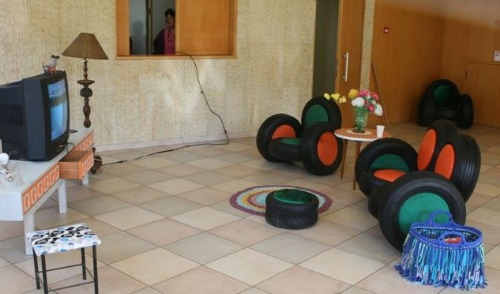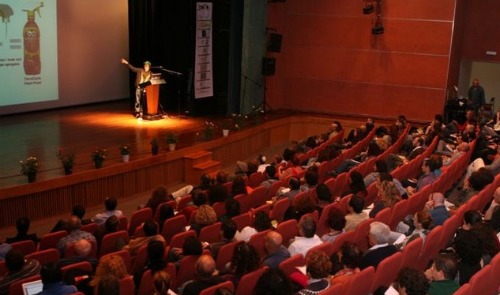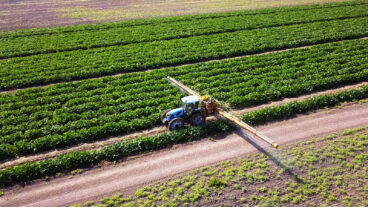Israeli ‘Reuse’ conference provides timely tips for green businesses including Retire, which fashions furniture and ponds from old tires.

In 2000, Hans Pallada had an idea. “There are untold thousands of used tires out there that I can build new things from. Why not turn it into a business?”
Pallada set up a company from his home in Pardess Hana-Karkur, cannily called Retired, and began by designing and manufacturing surprisingly comfortable armchairs and garden furniture from used tires and recycled materials. Since then he has expanded to children’s playgrounds, shaded sitting niches, fish ponds and even a swimming pool.
“We’re changing our immediate environment by using old tires,” he says. “It’s a hands-on, per-order operation. Everything we make is one of a kind – all different stuff, but based on the same principle. As a business, it’s becoming successful. A lot of other people [in Israel] are starting to do the same thing as me – which is a measure of success.”
The evolution of green thinking
“There’s a great change in mentality – green thinking is developing quickly here and there are more subsidies for environmentally friendly projects,” Dutch-born Pallada, 55, tells ISRAEL21c. He immigrated to Israel in 1980.
“The business is developing very well. The most important thing is that we work with schools and communities, and build together. That satisfaction is part of the win-win situation — when children build something themselves, they take better care of it afterwards.”
Retired was one of dozens of small businesses with an ecological bent on display at the March “Reuse” conference held in Pardess Hana-Karkur — the first of its type ever held in Israel.

“This event represents the prevailing wind in our town,” Mayor Haim Ga’ash, mayor of this central Israeli town of 35,000, told the 300-strong audience. “We have a critical mass of residents who not only care for the environment, but also for our future – not only welfare, but also well-being. The potential of reusing and recycling is enormous.”
Successful economies are powered by myriad small businesses, and dozens have sprouted up around Pardess Hana-Karkur in recent years that take existing things and find new uses for them – including some eclectic second-hand shops.
Tips from an upcycler
The day’s keynote speaker was Tom Szaky, CEO of Terracycle, the New Jersey-based business which specializes in making new products from post-consumer materials. The unassuming Montreal-raised entrepreneur recounted how he started as a Princeton University freshman with an idea to convert worm waste into fertilizer, on an industrial scale.
“Worm poop is a fantastic fertilizer, but no one would invest in this business, so we had to market it ourselves,” he related. Szaky sold his idea to Walmart, which made a massive order of the bottled fertilizer. Four years later, Terracycle is a multi-million dollar operation spanning 12 countries in three continents.
He introduced Israelis to the term “upcycling” – a new buzzword for taking used products and making new, salable items from them.

“There is no such thing as garbage in nature,” said Szaky, “yet we’re producing five billion tons worldwide annually. We’ve identified over 300 categories of household waste – separation is critical to maximizing value. Every type of waste stream is recyclable – juice bag wrappers, cigarette butts, diapers, whatever. There are three major categories: flexible waste, rigid packaging and complex waste comprising more than one substance – just look at your toothbrush or pen, for example.”
Groundbreaking packaging law
Israel still lags behind Europe and North America in terms of waste management, with the vast majority ending up in landfills. However, last year, the Knesset passed a revolutionary package recycling bill, which will oblige package manufacturers to send packaging waste for recycling. The target recycling rate is 60 percent within four years.
Solid waste expert Gilad Ostrovsky of the Israel Union of Environmental Defense (Adam, Teva V’Din) non-profit spoke of the importance of the packaging law to Israel’s physical future.
“This legislation is a great step forward,” he said. “From July 1, it will be possible to recycle glass and metal in Israel. Responsibility for recycling will fall on the manufacturers and importers, who will form corporations for that purpose. They also have to report exactly what their packaging consists of, and the Environmental Protection Ministry will set recycling quotas accordingly.
Higher charges to the corporations to recycle plastic and mixed packaging will act as an incentive to use paper and glass packaging instead. Collecting and transporting packages is the most expensive aspect of recycling, so there’ll be more bins and recycling centers.”
During an afternoon question-and-answer session, Szaky applauded Israel for passing the law. “Israel can prove to be the groundbreaker in the Middle East,” he predicted.
Szaky later had fruitful meetings with Minister of Environmental Protection Gilad Erdan and several major Israeli companies, according to Israeli Branch Manager Moran Twena.
Thinking globally, acting locally
“Sustainability is a way of life – there are no shortcuts,” said Ostrovsky. “Reusing products is a dominant component of this approach. Changing our values is a tremendous challenge, as it necessitates a dramatic reduction of consumption and massive reuse. The focus must be on the household,” he said.
Szaky had some advice for the small-scale entrepreneurs: “The fundamental reason Terracycle has succeeded is that we’ve worked with multinationals – they are far more aggressive and do things at a far greater scale.”
Scale is crucial to mass recycling operations, he noted. “Israel’s small population makes it a challenge. We store the collected materials in warehouses, until we reach critical mass. What takes a week in Brazil could take six months in Israel.”
Pallada came away from the conference full of inspiration. “I was very excited by what I heard – just realizing that it is feasible. There will soon be many more businesses like mine. There’s plenty of scope for small home-based businesses, but not enough opportunities yet. But this has begun to change.”











